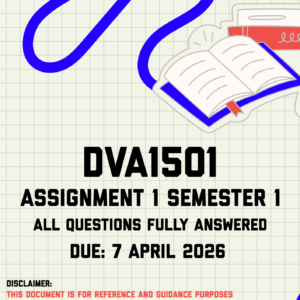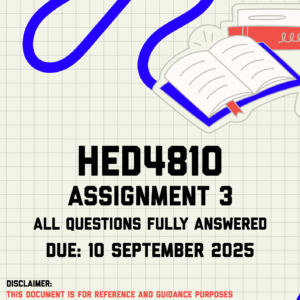Description
ENG1512 Assignment 1 Semester 1 | Due 19 March 2025. All questions answered. Question 1: Vocabulary building 1.1. Unit 1 of the study guide (TUT501) highlights that dictionaries help to provide the meaning of words. They can also be utilised to build vocabulary. As you read, you can use a dictionary to look up the meaning of unfamiliar words, which helps to expand your vocabulary. Find any newspaper article of approximately 150 words with content related to the field of economics and management. You can either attach a photo of the article to your answer book or type it out. Identify and underline or label new words you have learned from the article. Then, draft a paragraph of about 100 words to demonstrate your understanding of these words. 1.2 Explore various articles on Google Scholar to observe how the words provided in the table below are utilised in the context of economics and management. Identify and extract relevant sentences that exemplify their contextual usage. Ensure accurate citation of sources, including page numbers, and compile a full reference list of all sources utilised. In addition, carefully note the parts of speech provided for each word and strive to find sentence examples that match these parts of speech. Words Sentences from articles and citations Reference list a) Launch (verb) b) Venture (verb) c) Investment (noun) d) Innovation (noun) e) Proof (noun) f) Overdraft (noun) g) Testimony (noun) h) Peers (noun) i) Redress (verb) j) Merchant (noun) Question 2: Reading and comprehension Effective reading is crucial in this module, as it enables you to internalise key economic concepts, terminologies and build vocabulary. To comprehend your reading, engage with the texts and critically analyse the content. Read the following excerpt from an article and respond to the subsequent questions. lln a corporation , by contrast, the shareholders do not personally manage their money. Instead, a corporation is managed by directors and officers who need not be investors. Because managerial authority is concentrated in the hands of directors and officers, shares are freely transferable in the hands of directors and officers, shares are freely transferable unless otherwise agreed. They can be sold or given to anyone without placing other investors at the mercy of a new owner’s poor judgment. The splitting of management and ownership into distinct functions is the main corporate feature. Shareholders receive voting rights to elect the board of directors, and the directors, in turn, elect the officers. When a corporation is created, its officers, directors, and shareholders usually are the same people. They elect themselves or their nominees to the board of directors and then elect themselves as corporate officers. When the corporation later goes public, the founders usually prefer to retain control because they value the additional capital and because they expect to continue to control a maj ority of votes on the board and thus to direct the company’s future policy and growth. This text is excerpted from an English for Economics and Management Sciences material (an online resource) [Accessed: 12 December 2024]. 2.1 Read Unit 1 of the study guide (TUT501), particularly the subsection on reading strategies, and identify the reading strategy you employed to read the excerpt above. Specify the page number where this reading strategy is discussed and explain why you chose it. Your explanation must be in at least 3 or 4 sentences. 2.2 What would be the suitable title for this excerpt? justify. 2.3 Read steps on how to summarise on Page 15 of the study guide. In your own words, summarise the main points of the excerpt. 2.4 To show proficiency in writing, you must be able to coherently and cohesively produce sentences that are interconnected. Create a sentence that you think would logically transition, link and build up to a new paragraph. 2.5 On Page 20 of the study guide, ‘essential aspects of critical reading and thinking’ are discussed, including examples such as point of view, claims, allegations, speculations, facts, and opinions. As an academic, you should be able to separate these aspects of critical thinking. Which aspect do you think the following sentence from the excerpt above represents? Justify your answer. When a corporation is created, its officers, directors, and shareholders usually are the same people. (2 marks)












mindy98 –
Good thanks